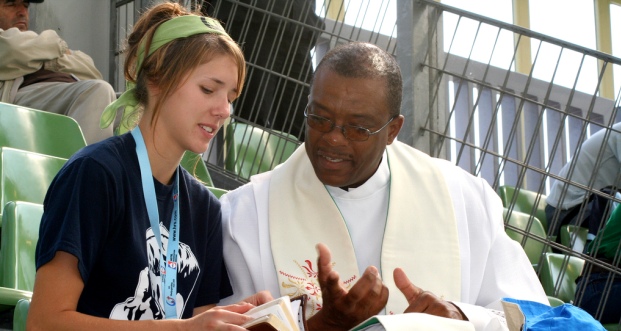Catholic Answers To Questions On Confession And Reconciliation

John 20: 19 – 23
On the evening of that first day of the week, when the doors were locked, where the disciples were, for fear of the Jews, Jesus came and stood in their midst and said to them, “Peace be with you.”
When he had said this, he showed them his hands and his side. The disciples rejoiced when they saw the Lord. Jesus said to them again, “Peace be with you. As the Father has sent me, so I send you.”
And when he had said this, he breathed on them and said to them, “Receive the holy Spirit. Whose sins you forgive are forgiven them, and whose sins you retain are retained.”
THE SACRAMENT OF PENANCE AND RECONCILIATION (ccc 1423 – 1433)
“Those who approach the sacrament of Penance obtain pardon from God’s mercy for the offense committed against him, and are, at the same time, reconciled with the Church which they have wounded by their sins and which by charity, by example, and by prayer labors for their conversion.
I. What is This Sacrament Called?
It is called the sacrament of conversion because it makes sacramentally present Jesus’ call to conversion, the first step in returning to the Father from whom one has strayed by sin.
It is called the sacrament of Penance, since it consecrates the Christian sinner’s personal and ecclesial steps of conversion, penance, and satisfaction.
It is called the sacrament of confession, since the disclosure or confession of sins to a priest is an essential element of this sacrament. In a profound sense it is also a “confession” – acknowledgment and praise – of the holiness of God and of his mercy toward sinful man.
It is called the sacrament of forgiveness, since by the priest’s sacramental absolution God grants the penitent “pardon and peace.”
It is called the sacrament of Reconciliation, because it imparts to the sinner the love of God who reconciles: “Be reconciled to God.” He who lives by God’s merciful love is ready to respond to the Lord’s call: “Go; first be reconciled to your brother.
II. Why a Sacrament of Reconciliation after Baptism?
“YOU were washed, you were sanctified, you were justified in the name of the Lord Jesus Christ and in the Spirit of our God.” One must appreciate the magnitude of the gift God has given us in the sacraments of Christian initiation in order to grasp the degree to which sin is excluded for him who has “put on Christ.” But the apostle John also says: “If we say we have no sin, we deceive ourselves, and the truth is not in us.” and the Lord himself taught us to pray: “Forgive us our trespasses,” linking our forgiveness of one another’s offenses to the forgiveness of our sins that God will grant us.
Conversion to Christ, the new birth of Baptism, the gift of the Holy Spirit and the Body and Blood of Christ received as food have made us “holy and without blemish,” just as the Church herself, the Bride of Christ, is “holy and without blemish.” Nevertheless the new life received in Christian initiation has not abolished the frailty and weakness of human nature, nor the inclination to sin that tradition calls concupiscence, which remains in the baptized such that with the help of the grace of Christ they may prove themselves in the struggle of Christian life. This is the struggle of conversion directed toward holiness and eternal life to which the Lord never ceases to call us.
III. The Conversion of the Baptized
Jesus calls to conversion. This call is an essential part of the proclamation of the kingdom: “The time is fulfilled, and the kingdom of God is at hand; repent, and believe in the gospel.” In the Church’s preaching this call is addressed first to those who do not yet know Christ and his Gospel. Also, Baptism is the principal place for the first and fundamental conversion. It is by faith in the Gospel and by Baptism that one renounces evil and gains salvation, that is, the forgiveness of all sins and the gift of new life.
Christ’s call to conversion continues to resound in the lives of Christians. This second conversion is an uninterrupted task for the whole Church who, “clasping sinners to her bosom, (is) at once holy and always in need of purification, (and) follows constantly the path of penance and renewal.” This endeavor of conversion is not just a human work. It is the movement of a “contrite heart,” drawn and moved by grace to respond to the merciful love of God who loved us first.
St. Peter’s conversion after he had denied his master three times bears witness to this. Jesus’ look of infinite mercy drew tears of repentance from Peter and, after the Lord’s resurrection, a threefold affirmation of love for him. The second conversion also has a communitarian dimension, as is clear in the Lord’s call to a whole Church: “Repent!”
St. Ambrose says of the two conversions that, in the Church, “there are water and tears: the water of Baptism and the tears of repentance.
IV. Interior Penance
Jesus’ call to conversion and penance, like that of the prophets before him, does not aim first at outward works, “sackcloth and ashes,” fasting and mortification, but at the conversion of the heart, interior conversion. Without this, such penances remain sterile and false; however, interior conversion urges expression in visible signs, gestures and works of penance.
Interior repentance is a radical reorientation of our whole life, a return, a conversion to God with all our heart, an end of sin, a turning away from evil, with repugnance toward the evil actions we have committed. At the same time it entails the desire and resolution to change one’s life, with hope in God’s mercy and trust in the help of his grace. This conversion of heart is accompanied by a salutary pain and sadness which the Fathers called animi cruciatus (affliction of spirit) and compunctio cordis (repentance of heart).
The human heart is heavy and hardened. God must give man a new heart. Conversion is first of all a work of the grace of God who makes our hearts return to him: “Restore us to thyself, O LORD, that we may be restored!” God gives us the strength to begin anew. It is in discovering the greatness of God’s love that our heart is shaken by the horror and weight of sin and begins to fear offending God by sin and being separated from him. the human heart is converted by looking upon him whom our sins have pierced:
Let us fix our eyes on Christ’s blood and understand how precious it is to his Father, for, poured out for our salvation it has brought to the whole world the grace of repentance.
Since Easter, the Holy Spirit has proved “the world wrong about sin,” i.e., proved that the world has not believed in him whom the Father has sent. But this same Spirit who brings sin to light is also the Consoler who gives the human heart grace for repentance and conversion.






